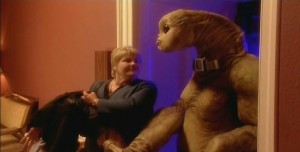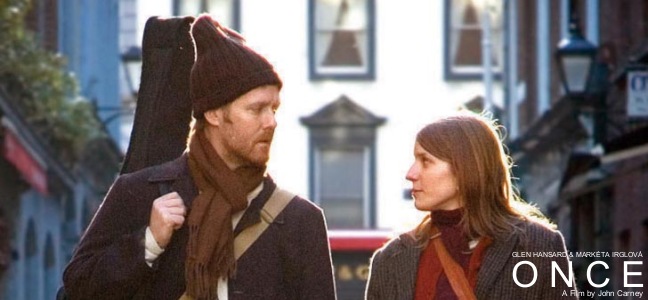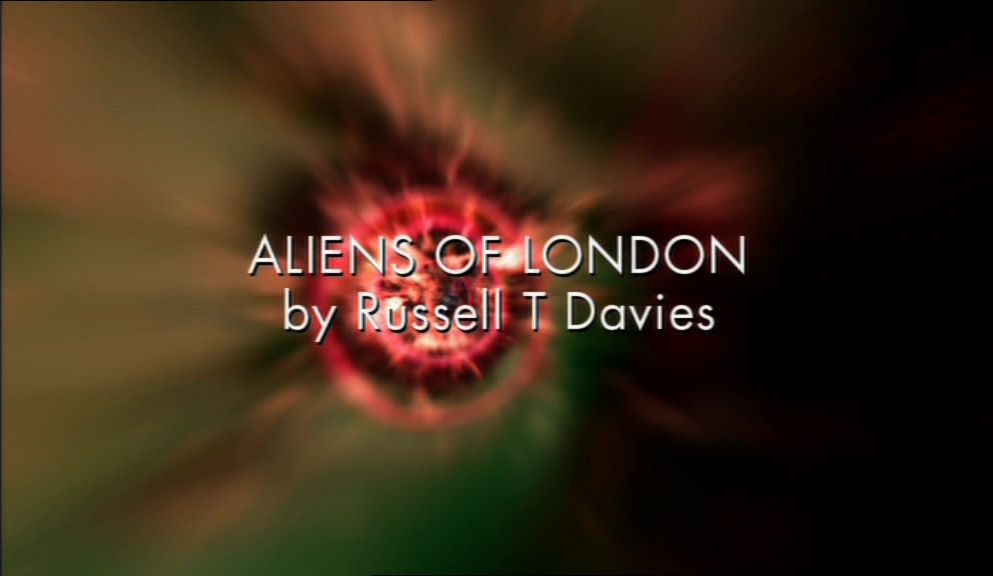
Episodes 4 and 5 of Doctor Who, “Aliens of London” and “World War Three,” comprise one story that explores the human instinct to self-preserve, and its alternative: self-sacrifice. The plot is constructed around an evil plan to reduce planet Earth to radioactive rubble to sell on the extraterrestrial market. The Slitheen family (aliens, of course. Raxacoricofallapatorian, to be exact) use the skin of some barely-influential people in the British government to hide their true identity (stay with me) as they put the pieces of their plan into place. It all begins with the crashing of a spaceship into Big Ben and with surprising ease, planet Earth is successfully thrown into a panic that has world leaders ready to release nuclear weapon codes to these poorly disguised perpetrators.
The human instinct to prioritize self-preservation is a quality the Slitheen count on in their elaborate plan. They fabricate a predicament that threatens the life of the planet and, having weaseled their way into positions of power, request nuclear codes to deal with the crisis, which they plan to immediately use on key countries of the world to start World War Three. Their assessment of humanity is such that they plan to wait safely in their nuclear-resistant spaceship while Earth wars against itself. They fully expect the humans to do their work for them, wiping themselves out and allowing the Slitheens to profit from all the fear and violence.
At the beginning of the episode, the Doctor expresses a more optimistic perspective on humanity, saying to Rose when the space ship first appears (and no one is quite certain what is happening):
The Doctor: “So maybe this is it! First contact! The day mankind officially comes into contact with an alien race. I’m not interfering because you’ve got to handle this on your own. That’s when the human race finally grows up. Just this morning you were all tiny and small and made of clay! Now you can expand!”
Though the theme is very much explored on a large scale (ie: all of humanity), the story is written to also allow the viewer to explore it on a more personal level through Jackie Tyler, Rose’s mother. The first scene opens to our travelers returning to Rose’s home-time and town. Aiming to return 12 hours after their initial departure, the Doctor blunderingly brings them back 12 months later. He realizes the mistake too late, for Rose has already encountered her mother, grief-stricken over the year of her daughter’s mysterious disappearance, and shocked at her nonchalant re-appearance. Jackie is simultaneously angry with and afraid of the Doctor. He is a central element in Rose’s sudden disappearance, and her daughter will not offer any information about him or where she’s been. Acting impulsively on fear and an instinct to protect her family, she does not try to listen or understand but places a call to report the Doctor as an alien. Though perhaps understandable, this gut reaction is counterproductive, putting the Doctor and Rose right into the villain’s hands.
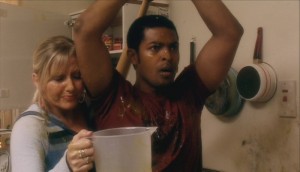 Jackie doesn’t have any context to understand or to trust the Doctor until he starts saving her and the world from creatures even stranger than he is. But though she at last reaches the point where she’s ready to listen and perhaps even to trust, there is one question that she cannot let go of: can you promise that you can keep my daughter safe? The Doctor and Rose both avoid the question–not because they aren’t sure what to answer, but because the answer is an immediate No. The climactic scene in Episode 5 is a clear picture of each of these characters’ response to personal danger:
Jackie doesn’t have any context to understand or to trust the Doctor until he starts saving her and the world from creatures even stranger than he is. But though she at last reaches the point where she’s ready to listen and perhaps even to trust, there is one question that she cannot let go of: can you promise that you can keep my daughter safe? The Doctor and Rose both avoid the question–not because they aren’t sure what to answer, but because the answer is an immediate No. The climactic scene in Episode 5 is a clear picture of each of these characters’ response to personal danger:
The Doctor: [considering firing a missile at 10 Downing Street (where he and Rose are trapped) to destroy the Slitheens] “That’s the thing. If I don’t dare, everyone dies.
Rose Tyler: Do it.”
The Doctor: “You don’t even know what it is. You’d just let me?”
Rose Tyler: “Yeah.”
Jackie Tyler [on speaker phone]: “Please, Doctor, please, she’s my daughter; she’s just a kid.”
The Doctor: “Do you think I don’t know that? ‘Cause this is my life, Jackie – it’s not fun, it’s not smart, it’s just standing up and making a decision because nobody else will.”
Rose Tyler: “Then what are you waiting for?”
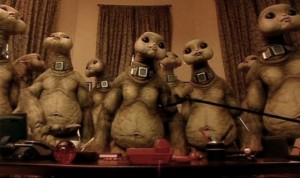 I sympathize with Jackie’s concern for her daughter, with her gut reaction to save herself and her family when face to face with danger. But in this episode, anyone who escapes impending doom is rescued because of the efforts of people helping one another, and not because they are helping themselves: Jackie’s life is saved by Mickey, who helps her fight off a Slitheen; the Doctor and Rose need Mickey to access missile codes and Mickey needs the Doctor and Rose to figure out how to defeat the creature that is attacking them; Rose is about to be killed by a Slitheen when a new character, Harriet Jones, jumps out and distracts the creature at great risk to her own life.
I sympathize with Jackie’s concern for her daughter, with her gut reaction to save herself and her family when face to face with danger. But in this episode, anyone who escapes impending doom is rescued because of the efforts of people helping one another, and not because they are helping themselves: Jackie’s life is saved by Mickey, who helps her fight off a Slitheen; the Doctor and Rose need Mickey to access missile codes and Mickey needs the Doctor and Rose to figure out how to defeat the creature that is attacking them; Rose is about to be killed by a Slitheen when a new character, Harriet Jones, jumps out and distracts the creature at great risk to her own life.
In the end, it is a joint effort that brings down the threat to the world and saves the day. I find it interesting that this story does not present the typical villain who acts alone for his own gain and glory and no one else’s: The Slitheens are a family who actually hold great love, affection, and loyalty for one another (but they want to render humans extinct and all that, so they get to be the bad guys). Working in unity, the Slitheens very nearly win. It is only when humans are able to overcome their weaknesses by putting aside self-preservation and, instead, sacrificing for one another that the Slitheens find their plans disintegrating. Good prevails and bad fails when the good guys work together.

